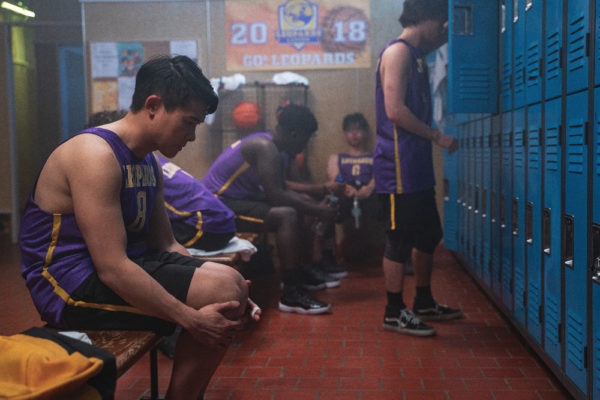
Coming out stories are a common feature of LGBT cinema, so it’s hard to make a contemporary film stand out. Golden Delicious, the feature film debut from director Jason Karman and screenwriter Gorrman Lee, doesn’t do much to shake up the formula, though it has enough charm and emotion to satisfy.
Jake (Cardi Wong) is a typical teenager. He’s entering his last year of high school, he’s in a long-term committed relationship with girlfriend Valerie (Parmiss Sehat) and he begrudgingly plays basketball at the behest of his father George (Ryan Mah) and to spend time with his friends, Sam (Hunter Dillon) and Gary (Zavien Garrett). Everything is quietly humming along…until Jake catches sight of new neighbour Aleks (Chris Carson), who is both openly queer and hot.
One of the most relatable aspects of the film is how Jake’s uncertainty about his identity manifests itself in the character’s inability to advocate for his own goals and wishes. V is frustrated because Jake hasn’t completed his university applications and he’s not even sure he wants to play on the basketball team until his interest in Aleks prompts him to re-evaluate. (It’s obvious to the audience that Jake’s true passion is photography: he spends most of the first act taking pictures and his work is prominently displayed in his bedroom as a constant visual reminder that’s literally framed in the background).
Rather than be true to himself, Jake ultimately tries out for the basketball team, to the chagrin of the team’s captain, Ronald (Jesse Hyde) and in spite of a hand injury sustained in a rough pick-up game with his father and . And he continues to play pretend with Val, passively agreeing about a future together at university and even marriage, even as he covertly takes pictures of Aleks’ shirtless torso before escalating the relationship into sexual territory.
The more that Jake struggles to adhere to the socially imposed ideals that his parents and girlfriend demand of him, the more the facade cracks. It’s these scenes, early in the film, when Golden Delicious is at its (admittedly conventional LGBT film) best: Jake’s internal struggle to discover who he is and be true to his own desires when they stand in stark contrast to the expectations that others have of him.

Lee’s script never fully addresses how aware Jake is of his own queerness, but it’s clear that things with Val aren’t working sexually. In this capacity, Golden Delicious features a number of familiar tropes of coming out narratives, including Jake’s failed attempts to be intimate with Val, a few sexually charged sequences with Aleks, and a loving, albeit strained relationship between Jake and his parents.
Despite most of this playing out in expected fashion, the film is always highly watchable, particularly Jake’s struggle to live up to everyone’s expectations of him despite his growing desire for Aleks. The fact that Wong is so likeable in the lead role and has good chemistry with both Sehat and Carson helps immeasurably.
These scenes work best because Jake’s struggle is imminently relatable and the scope of the film is contained. The central love triangle is only half of the film’s interest, though. Golden Delicious is as much a family tale as it is a coming out story, a fact that only becomes more obvious in the back half as the drama unfolding between Jake’s parents takes over the narrative.
This isn’t an entirely new development since the nuclear family is well established by this point. Mom Andrea (Leeah Wong) is worn down from working at the family’s titular Chinese food restaurant with George, who is both demanding and slightly controlling. The two parents don’t display much affection for each other (they bicker at the restaurant, and frequently arrive home separately), so it’s no surprise when it’s revealed that the marriage is in trouble.
Both Jake and the parents’ storyline play into the film’s message about following your dreams and being true to yourself. Andrea lost herself when she and George got pregnant at an early age, requiring them to give up their dreams when they took over the restaurant from his parents. Andrea’s simmering resentment of her own situation is why she routinely confronts her eldest child, daughter Janet (Claudia Kai), about her culinary ambitions, never realizing that Janet is following her dreams.
The same is true for George and Jake. George’s teenage basketball glory is literally enshrined in the high school trophy case that Jake walks by every day, but George can’t see that the pressure he puts on his closeted son to perform on the court is about his failed dreams, not Jake’s.

Unfortunately as the scope of the film broadens to include the parents’ dissolving marriage, Golden Delicious loses its focus by attempting to cover too much ground. The result, particularly the last act, is an ending that is both a little too quick and a little too pat.
Jake (expectedly) messes things up with both Aleks and Val, but his pleas for forgiveness are too brief and too easily accepted to be satisfying. There’s a brief suggestion of the season changing using imagery of water dripping off the family’s ancient basketball hoop, but in the film’s runtime, mere minutes pass between the third act miscommunication/misunderstanding and Jake’s happy ending.
From the perspective of a queer coming out story, Golden Delicious ends with a sweet, romantic flourish that confirms Jake is going to be ok.
From a storytelling perspective, however, it plays more like the filmmakers wanted to skip over the difficult stuff and jump straight to the happy resolution. The end offers closure and reassurance that these characters will be ok, but Golden Delicious needed a few more minutes of Jake making amends and putting in the work to repair his relationships, and/or a little less forgiveness.
Considering the film that precedes it, hinting that Jake still has some growing up to do to discover who he is would have been a more fitting end. As it is, this feel good ending is a little too simple for what Lee and Karman initially set out to explore. 3.5 out of 5
Golden Delicious is currently doing the festival circuit, including Inside/Out and Frameline